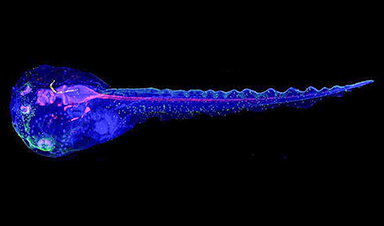| Would you like to help in some research on the regulation of what future AI-driven nanomedicines should look like? If so, researchers at the University of Bristol are looking for volunteers to discuss ethical and regulatory issues of using AI driven cancer therapies with swarm behaviour through a series of interviews. | |
| The research is part of the SWARM study – Small robots With collective behaviour as AI-driven cancer therapies; building Regulations for future nanoMedicines. | |
| The researchers are looking for: | |
|
|
| Volunteers must be over the age of 18 years old to take part. We would love to hear from you. You can find out more about the study on our SWARM study webpage or by contacting Matimba Swana at matimba.swana@bristol.ac.uk. | |
| If you would like to take part please complete this Expression of Interest Form. | |
About the SWARM study |
| Cancer occurs when abnormal cells divide in an uncontrolled way. Many cancers can be cured. But in some people cancer can return. Cancer drugs, such as chemotherapy, need to be able to kill all the cancer cells, but this means they can also kill healthy cells. | |
| Nanomedicine is the medical application of nanotechnology which works on tiny scales called ‘nanometres’ (one-billionth of a metre). Nanoparticles are nanosized particles that can assist the delivery of chemotherapy drugs to cancer cells. Scientists and Engineers can use simulations for selecting nanoparticles so drugs can more effectively reach the tumour while avoiding side effects. | |
| Nanoswarms | |
| Using simulations, scientists and engineers are working on adding swarm behaviour (present in social animals such as birds, ants, fish and termites) to nanoparticles and tiny robots (nanobots). Nanoswarms are multiple nanoparticles or nanobots that can interact with each other or their environment to achieve a task (e.g. deliver chemotherapy to a tumour without killing healthy cells), exhibiting collective behaviour inspired by swarm behaviour. | |
| SWARM study – aim & research question | |
| This project is investigating the ethics and regulations of the first in-human clinical trial of nanoswarms. We will be using interviews initially and focus groups in the next phase to explore the attitudes of stakeholders towards this swarm technology in healthcare, combined with ethical/legal analysis to consider how swarm medicine should be regulated in clinical trials. | |
| The aim is to explore how nanoswarm medicine should be regulated once this technology is available for first-in human clinical trials. | |
| Researchers | |
| This study is being organised by Matimba Swana, PhD student in the Trustworthy Autonomous Systems in Functionality Node and Academic Supervisors; Dr. Sabine Hauert, Reader (Associate Professor) in Swarm Engineering and Prof. Jonathan Ives, Professor of Empirical Bioethics & Deputy Director of Centre for Ethics in Medicine. | |
Would you like to participate? |
|
| If you are aged 18 or over, we would love to hear from you. For the interviews we are looking for oncology healthcare professionals or oncology patients or those working in drug delivery regulation or in nanomedicine research. You do not need to have any previous knowledge of nanoswarms to participate as we will show you case studies to introduce you to the technologies. | |
| Your contribution would be very helpful! For more details please contact Matimba Swana at matimba.swana@bristol.ac.uk OR complete this Expression of Interest form for interviews. | |
| We are still in the first phase of this study, so will not start interviews until later in the year, but please complete the Expression of Interest form for interviews and we will be in touch to schedule an interview. We will start recruiting for focus groups in early 2023. | |
Five fun facts |
|
|
|
| The SWARM study is part of a larger UKRI-funded PhD which is part of the Trustworthy Autonomous Systems Node in Functionality research programme, which is a multidisciplinary collaboration between ethicists, sociologists, computer scientists and engineers working together to produce guidelines for the development of trustworthy autonomous systems with evolving functionality. | |
Research Ethics Approval |
|
| This project has been reviewed and approved by the University of Bristol Faculty of Engineering Research Ethics Committee (Ref: 11141). | |
| Find out more before participating from these PDFs: | |
| SWARM study summary | |
| SWARM flyer Interviews | |
| Participant Information Sheet for Interviews | |
| SWARM flyer focus groups | |
| Participant Information for Focus Groups (will be live once interviews are completed) | |
| Expression of Interest for Focus Groups (will be live once interviews are completed) |
News
AI matches doctors in mapping lung tumors for radiation therapy
In radiation therapy, precision can save lives. Oncologists must carefully map the size and location of a tumor before delivering high-dose radiation to destroy cancer cells while sparing healthy tissue. But this process, called [...]
Scientists Finally “See” Key Protein That Controls Inflammation
Researchers used advanced microscopy to uncover important protein structures. For the first time, two important protein structures in the human body are being visualized, thanks in part to cutting-edge technology at the University of [...]
AI tool detects 9 types of dementia from a single brain scan
Mayo Clinic researchers have developed a new artificial intelligence (AI) tool that helps clinicians identify brain activity patterns linked to nine types of dementia, including Alzheimer's disease, using a single, widely available scan—a transformative [...]
Is plastic packaging putting more than just food on your plate?
New research reveals that common food packaging and utensils can shed microscopic plastics into our food, prompting urgent calls for stricter testing and updated regulations to protect public health. Beyond microplastics: The analysis intentionally [...]
Aging Spreads Through the Bloodstream
Summary: New research reveals that aging isn’t just a local cellular process—it can spread throughout the body via the bloodstream. A redox-sensitive protein called ReHMGB1, secreted by senescent cells, was found to trigger aging features [...]
AI and nanomedicine find rare biomarkers for prostrate cancer and atherosclerosis
Imagine a stadium packed with 75,000 fans, all wearing green and white jerseys—except one person in a solid green shirt. Finding that person would be tough. That's how hard it is for scientists to [...]
Are Pesticides Breeding the Next Pandemic? Experts Warn of Fungal Superbugs
Fungicides used in agriculture have been linked to an increase in resistance to antifungal drugs in both humans and animals. Fungal infections are on the rise, and two UC Davis infectious disease experts, Dr. George Thompson [...]
Scientists Crack the 500-Million-Year-Old Code That Controls Your Immune System
A collaborative team from Penn Medicine and Penn Engineering has uncovered the mathematical principles behind a 500-million-year-old protein network that determines whether foreign materials are recognized as friend or foe. How does your body [...]
Team discovers how tiny parts of cells stay organized, new insights for blocking cancer growth
A team of international researchers led by scientists at City of Hope provides the most thorough account yet of an elusive target for cancer treatment. Published in Science Advances, the study suggests a complex signaling [...]
Nanomaterials in Ophthalmology: A Review
Eye diseases are becoming more common. In 2020, over 250 million people had mild vision problems, and 295 million experienced moderate to severe ocular conditions. In response, researchers are turning to nanotechnology and nanomaterials—tools that are transforming [...]
Natural Plant Extract Removes up to 90% of Microplastics From Water
Researchers found that natural polymers derived from okra and fenugreek are highly effective at removing microplastics from water. The same sticky substances that make okra slimy and give fenugreek its gel-like texture could help [...]
Instant coffee may damage your eyes, genetic study finds
A new genetic study shows that just one extra cup of instant coffee a day could significantly increase your risk of developing dry AMD, shedding fresh light on how our daily beverage choices may [...]
Nanoneedle patch offers painless alternative to traditional cancer biopsies
A patch containing tens of millions of microscopic nanoneedles could soon replace traditional biopsies, scientists have found. The patch offers a painless and less invasive alternative for millions of patients worldwide who undergo biopsies [...]
Small antibodies provide broad protection against SARS coronaviruses
Scientists have discovered a unique class of small antibodies that are strongly protective against a wide range of SARS coronaviruses, including SARS-CoV-1 and numerous early and recent SARS-CoV-2 variants. The unique antibodies target an [...]
Controlling This One Molecule Could Halt Alzheimer’s in Its Tracks
New research identifies the immune molecule STING as a driver of brain damage in Alzheimer’s. A new approach to Alzheimer’s disease has led to an exciting discovery that could help stop the devastating cognitive decline [...]
Cyborg tadpoles are helping us learn how brain development starts
How does our brain, which is capable of generating complex thoughts, actions and even self-reflection, grow out of essentially nothing? An experiment in tadpoles, in which an electronic implant was incorporated into a precursor [...]





















